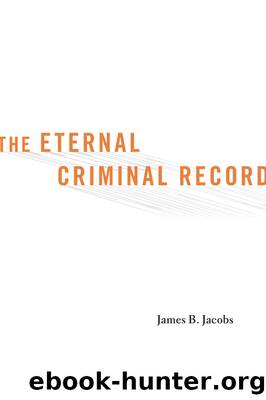The Eternal Criminal Record by James B. Jacobs

Author:James B. Jacobs [Jacobs, James B.]
Language: eng
Format: epub
Tags: Social Science, Criminology, Law, Criminal Law, General, Political Science, Law Enforcement
ISBN: 9780674967168
Google: ePhoBgAAQBAJ
Publisher: Harvard University Press
Published: 2015-02-09T04:14:52+00:00
Conclusion
It seems counterintuitive, indeed outrageous, that every police officer has the power to stigmatize any person with a lifelong arrest record. Yet this is more or less the case, except in a few states where arrests not resulting in convictions must be sealed. This anomalous situation is caused by the fact that police rap sheets have come to be widely used by nonâcriminal justice agencies, organizations and individuals. Prior arrest information often provides important leads for current investigations. It is also necessary for defensive documentation in case the police are sued for wrongful arrest. However, it is not legitimate for the police or prosecutors to use arrest information to shame arrestees, even if it could be shown that this practice contributes to general or specific deterrence. Naming and shaming is a controversial form of punishment in the sentencing context, but indefensible when meted out by police.
From a law enforcement point of view, arrest and arrestee information is important whether or not it results in a conviction. Neither the police nor the criminal record repositories should disclose to nonâlaw enforcement agencies arrests that have been pending for more than one year, especially when the same information exists in publicly accessible court records.d New Yorkâs practice of sealing arrest records when charges are resolved favorably to the defendant (i.e., dismissal) is a sound policy. However, even in New York, the arrestee cannot be sure that the arrest information will actually be removed from the rap sheet and other police databases, much less court records.
The existence of the commercial information sector makes it increasingly likely that arrest information that is pending for months and even years will be downloaded to a proprietary database and thereafter disseminated to employers and other customers. The FCRA restriction on disseminating information on arrests more than seven years old is unsatisfactory. Why should someone who has been arrested but never convicted bear a criminal stigma for seven years (actually much longer, since the information that has been publicly available for seven years remains in the public mind far longer)? The FCRA should be amended to require that arrest information that did not result in a conviction within a year not be circulated to nonâcriminal justice agencies, organizations, associations, and individuals. Whether such a law would withstand a First Amendment challenge remains to be seen.
Download
This site does not store any files on its server. We only index and link to content provided by other sites. Please contact the content providers to delete copyright contents if any and email us, we'll remove relevant links or contents immediately.
Constitutional Law by Erwin Chemerinsky;(174)
Solve Your Money Troubles by Amy Loftsgordon;Cara O'Neill;(168)
European Witch Trials (RLE Witchcraft) by Richard Kieckhefer(167)
Sentencing and Artificial Intelligence by Ryberg Jesper;Roberts Julian V.;(164)
Roman Law and Economics by unknow(155)
Dictionary of American Criminal Justice by Dean J. Champion(153)
Juvenile Risk and Needs Assessment by Christopher J. Sullivan Kristina K. Childs(142)
Policing the Police : Knowledge Management in Law Enforcement by Petter Gottschalk(142)
A Constitution for the Living by Beau Breslin(141)
Zionism, Palestinian Nationalism and the Law: 1939-1948 by Steven E Zipperstein(138)
The Supreme Court's Role in Mass Incarceration by William T. Pizzi(135)
Incarceration without Conviction by Mikaela Rabinowitz(135)
Crime and the Life Course by Michael L. Benson(132)
Lawyers, Lead On by Williford Rebecca S.;Basas Carrie A.;Enyart Stephanie L.;(132)
Law for Student Police Officers by Merritt Jonathan;(132)
The Eternal Criminal Record by James B. Jacobs(130)
The Legal Guide for Museum Professionals by Courtney Julia;(129)
Juvenile Homicides : A Social Disorganization Perspective by Minna K. Laurikkala(123)
Revitalizing Victimization Theory by Travis C. Pratt Jillian J. Turanovic(122)
